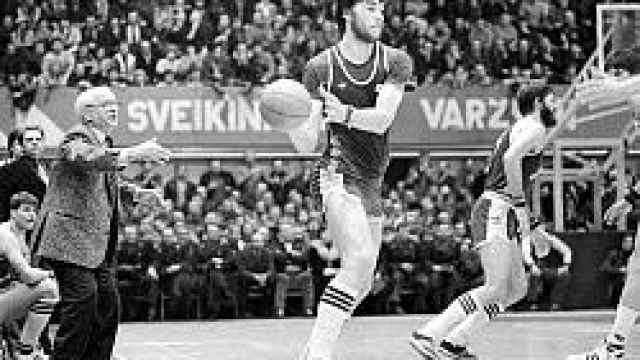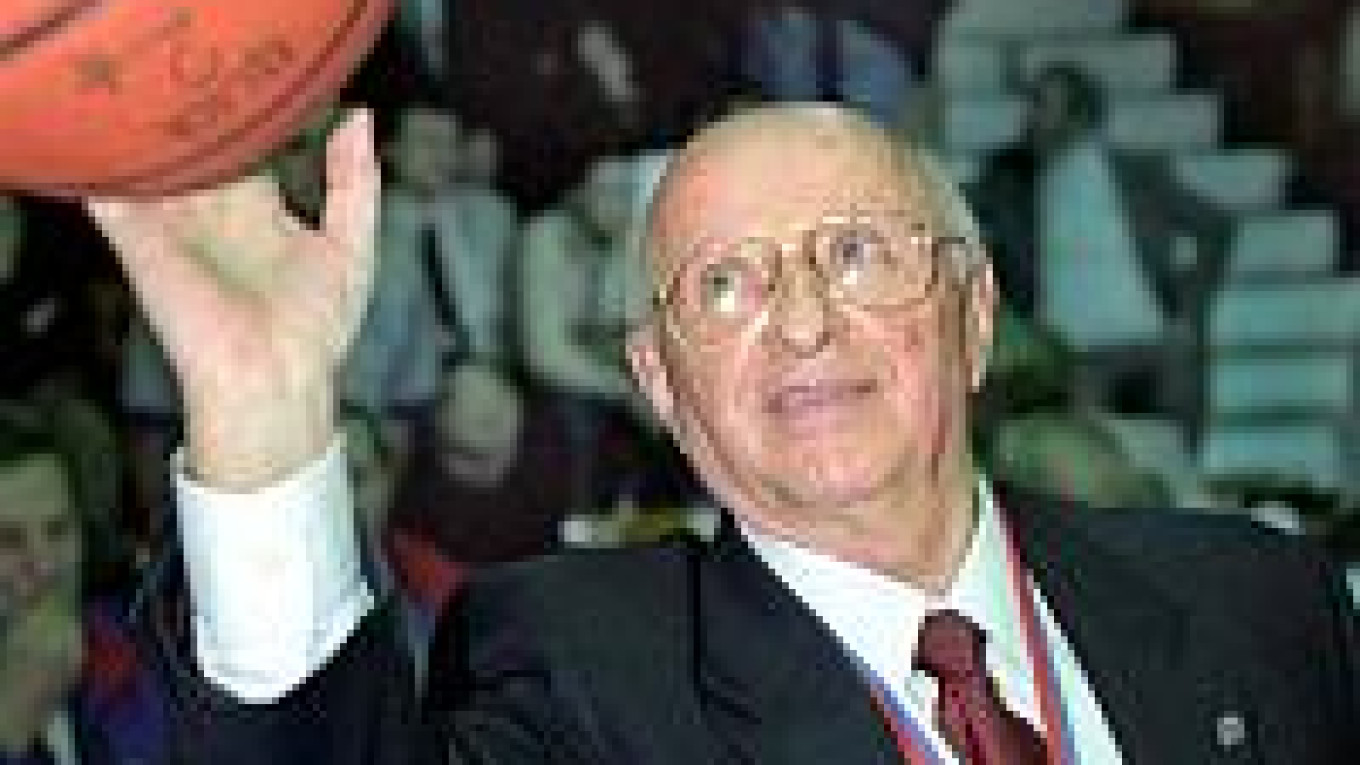In a career that spanned four decades, Gomelsky, known as the "Silver Fox" in the West for his gray hair and simply "Papa" with fans back home, was one of international basketball's most famous coaches, leading Soviet club teams to five European Championships and the Soviet national team to eight European Championships and one World Championship.
But Gomelsky made perhaps his most indelible mark on international basketball in 1988, coaching the Soviet national team to a gold medal in the Seoul Olympics after toppling the United States in the semifinals.
The victory over the U.S. team, a collection of college stars led by future Hall of Fame center David Robinson, was widely seen as a turning point in international basketball that showed the United States could no longer guarantee Olympic gold by putting amateurs on the court against the rest of the world's finest.
It was only the second loss for the United States in 87 Olympic basketball matches, the first being a controversial loss to the Soviet Union in the 1972 Munich Games.
The 1988 Seoul Games marked the last time amateurs made up a U.S. Olympic basketball team. Barcelona in 1992 saw the introduction of the Dream Team, a collection of NBA stars including Michael Jordan, Magic Johnson and Larry Bird that is generally regarded as the greatest team ever assembled.
After capturing the gold medal in Seoul, Gomelsky showed his foresight by praising the possible inclusion of NBA players in international competitions at a time when many basketball observers were skeptical that international teams could ever beat professionals from the country where the game was invented.
"I'm a basketball man," Gomelsky, speaking in his trademark halting English, said at the time. "I want our sport to be No. 1 in world. Maybe it not possible to beat NBA boys the first time, but in 10 years, maybe it is possible."
Fourteen years later, a U.S. team made up of NBA players finished a dismal eighth place at the World Championships in Indianapolis, and in the 2004 Athens Games another batch of NBA stars became the first U.S. team to fail to capture Olympic gold since 1992, managing only a bronze.
Borislav Stankovic, Gomelsky's longtime friend and former secretary general of the Geneva-based International Basketball Federation, or FIBA, had long been a staunch supporter of abolishing the distinction between amateurs and professionals, which prevented U.S. professionals from competing in the Olympics, despite much opposition from U.S. basketball officials.
The rule was finally abolished in 1989, and "it is fair to say that Gomelsky and his success in 1988 might have been a final catalyst for this decision," Stankovic said through a spokesman Tuesday.
The rule was finally abolished in 1989, and "it is fair to say that Gomelsky and his success in 1988 might have been a final catalyst for this decision," Stankovic said through a spokesman Tuesday.
Born in Kronstadt, near St. Petersburg, on Jan. 18, 1928, Gomelsky began his coaching career at the Leningrad club LGS Spartak in 1949, and three years later he made his first major impact on European club basketball, when his ASK Riga team captured the first of three European Champions Cup titles.
Gomelsky stayed with the Riga club until 1966, winning five Soviet club titles in the process, before moving to Moscow to take the helm at CSKA, the Red Army club.
It was during his stint with CSKA that the Gomelsky legend began to take shape, as he guided the club to European titles in 1969 and 1971.
Gomelsky served three stints as head coach of the national team -- 1958-60, 1962-70 and 1976-88 -- but, despite his success, had a rocky tenure. He later attributed his demotions to the fact he was Jewish.
The "KGB thought I would go to Israel. I saw documents that showed KGB believed I would leave," Gomelsky told the Los Angeles Times in 1992. "In Israel, I was very popular. Not many Israel coaches have same results as Gomelsky, and KGB knew this. KGB does not like Jewish man coaching Russian national team. Government does not like Jewish men. I have lots of enemies."
But Sergei Belov, one of Gomelsky's star players for CSKA and the national team, said that his former coach's problems simply came with the territory.
 Itar-Tass Gomelsky coaching CSKA in the Soviet league against Lithuanian club Zalgiris and its star Arvydas Sabonis in 1985. | |
The most difficult moment in Gomelsky's career came during the 1972 Munich Olympics, when the Soviet national team defeated the United States 51-50 to win the gold medal after a controversial finale.
The Soviets were trailing 50-49 with three seconds remaining and, with disputes at the scorers' table, were given three chances to inbound the ball. The first two failed, and the Americans celebrated both times, thinking they had won. But after a contentious intervention by FIBA secretary general William Jones, Soviet star Alexander Belov caught a full-court pass on the final try and laid the ball in the basket to take the gold, marking the first time the United States had lost an Olympic match. The U.S. team members refused to accept their silver medals following the controversy.
Gomelsky, who always referred to that Soviet team as "my boys," watched the game from his Moscow apartment, having been removed as head coach after a disappointing bronze medal at the 1970 World Championships.
Gomelsky told the Los Angeles Times that he cried after watching the historic game and poured himself a glass of vodka. "It is something I have had to live with," he told the newspaper. "It is the biggest scar on my heart."
Redemption for Gomelsky came only with Olympic gold in Seoul, as well as the victory over the Americans in the semifinal, Belov said.
"The semifinal win was the culmination of his life's work," Belov said.
Gomelsky's players said the genius of the diminutive and fiery coach lay in the way he prepared players psychologically rather than in tactical know-how.
"We weren't confident we could beat the Americans," Sarunas Marciulionis, who together with fellow Lithuanian stars Arvydas Sabonis and Rimas Kurtinaitis helped form the nucleus of the Soviet team, said by telephone from Vilnius on Tuesday. "But we had two days' rest before the semifinal, and he came to our rooms at night, telling each player two or three times that we could beat them."
On Tuesday, the basketball world expressed its sorrow at the passing of Gomelsky, who was inducted into the Basketball Hall of Fame in Springfield, Massachusetts, in 1995.
NBA commissioner David Stern called Gomelsky "one of the greatest basketball coaches on the world stage."
"He will forever be remembered as the father of Soviet and Russian basketball," Stern said in a statement.
Former FIBA chief Stankovic described Gomelsky as "one of the most influential figures in international basketball."
"I have known him personally for over 40 years, and not only have we lost an extraordinary basketball leader, but I have also lost a personal friend," Stankovic said in a statement.
In a statement from Geneva on Tuesday, FIBA secretary general Patrick Baumann said Gomelsky's "knowledge and expertise, as well as his energy and determination, will always be remembered."
After Seoul, Gomelsky retired as national team coach, and in 1997 he took over as president of CSKA, a post he held until his death. CSKA has been one of the best clubs in Europe in recent years, narrowly losing in the semifinals of the Euroleague, Europe's strongest club competition, each of the past three seasons.
Jordi Bertomeu, CEO of Euroleague Basketball, said in a statement Tuesday that basketball lovers owed Gomelsky "a great debt of gratitude for his unique contributions to our sport."
President Vladimir Putin expressed his condolences in a statement posted on the Kremlin web site Tuesday, and Vyacheslav Fetisov, head of the Federal Agency for Physical Culture and Sports, described Gomelsky's passing as a "loss for the entire sporting world," RIA-Novosti reported.
On Thursday, a memorial service for Gomelsky will be held at the CSKA offices on Leningradsky Prospekt at 11 a.m., and he will be interred in the Vagankovskoye Cemetery at 3:30 p.m., the club said Tuesday.
Gomelsky is survived by his wife, Tatyana, and four sons.
A Message from The Moscow Times:
Dear readers,
We are facing unprecedented challenges. Russia's Prosecutor General's Office has designated The Moscow Times as an "undesirable" organization, criminalizing our work and putting our staff at risk of prosecution. This follows our earlier unjust labeling as a "foreign agent."
These actions are direct attempts to silence independent journalism in Russia. The authorities claim our work "discredits the decisions of the Russian leadership." We see things differently: we strive to provide accurate, unbiased reporting on Russia.
We, the journalists of The Moscow Times, refuse to be silenced. But to continue our work, we need your help.
Your support, no matter how small, makes a world of difference. If you can, please support us monthly starting from just $2. It's quick to set up, and every contribution makes a significant impact.
By supporting The Moscow Times, you're defending open, independent journalism in the face of repression. Thank you for standing with us.
Remind me later.


